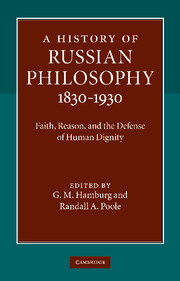Book contents
- Frontmatter
- Contents
- List of contributors
- Acknowledgments
- Introduction: The humanist tradition in Russian philosophy
- I The Nineteenth Century
- II Russian Metaphysical Idealism in Defense of Human Dignity
- III Humanity and Divinity in Russian Religious Philosophy after Solov′ëv
- IV Freedom and Human Perfectibility in the Silver Age
- 11 Religious humanism in the Russian Silver Age
- 12 Russian liberalism and the philosophy of law
- 13 Imagination and ideology in the new religious consciousness
- 14 Eschatology and hope in Silver Age thought
- V Russian Philosophy in Revolution and Exile
- Afterword: On persons as open-ended ends-in-themselves (the view from two novelists and two critics)
- Bibliography
- Index
11 - Religious humanism in the Russian Silver Age
Published online by Cambridge University Press: 05 June 2012
- Frontmatter
- Contents
- List of contributors
- Acknowledgments
- Introduction: The humanist tradition in Russian philosophy
- I The Nineteenth Century
- II Russian Metaphysical Idealism in Defense of Human Dignity
- III Humanity and Divinity in Russian Religious Philosophy after Solov′ëv
- IV Freedom and Human Perfectibility in the Silver Age
- 11 Religious humanism in the Russian Silver Age
- 12 Russian liberalism and the philosophy of law
- 13 Imagination and ideology in the new religious consciousness
- 14 Eschatology and hope in Silver Age thought
- V Russian Philosophy in Revolution and Exile
- Afterword: On persons as open-ended ends-in-themselves (the view from two novelists and two critics)
- Bibliography
- Index
Summary
INTRODUCTION: RUSSIAN RELIGIOUS HUMANISM
In European history, “humanism” originally denoted an intellectual and cultural movement, based on the study of Latin and Greek texts, that began in the Renaissance. The term came to mean any system of thought that asserts the value and worth of man (individually and/or collectively) and focuses on human needs, interests, and values. There are secular humanists and religious humanists.
The religious philosophers of the Russian Silver Age were humanists. They foregrounded man's spiritual and psychological needs, raised issues of meaning and values, and exalted human agency and creativity. They wanted to sanctify this world, including “the flesh” (sex). Their philosophy incorporated aspects of Orthodox Christianity, such as anti-rationalism, the apotheosis of beauty, transfiguration, deification, and a holistic ontology. The last aspiration underlay their desire for “integral knowledge” in epistemology, “total unity” (vsëedinstvo) in metaphysics, and their social ideal – sobornost′ (a free society united by love and common ideals whose members retain their individuality). By “individuality” they meant self-expression and personal development within a community, rather than apart from or against it. Several humanists exalted Sophia (divine wisdom or “the eternal feminine”).
The most prominent religious humanists were (in alphabetical order) Nikolai Berdiaev (1874–1948), Sergei Bulgakov (1871–1942), Pavel Florenskii (1882–1937), Semën Frank (1879–1950), Zinaida Gippius (1869–1945), Viacheslav Ivanov (1866–1949), Dmitrii Merezhkovskii (1865–1941), Vasilii Rozanov (1856–1919), Sergei Trubetskoi (1862–1905), his brother Evgenii Trubetskoi (1863–1920), Lev Shestov (1866–1935), and the symbolist poets Andrei Belyi (1890–1934) and Aleksandr Blok (1880–1921).
Keywords
- Type
- Chapter
- Information
- A History of Russian Philosophy 1830–1930Faith, Reason, and the Defense of Human Dignity, pp. 227 - 247Publisher: Cambridge University PressPrint publication year: 2010
- 1
- Cited by

